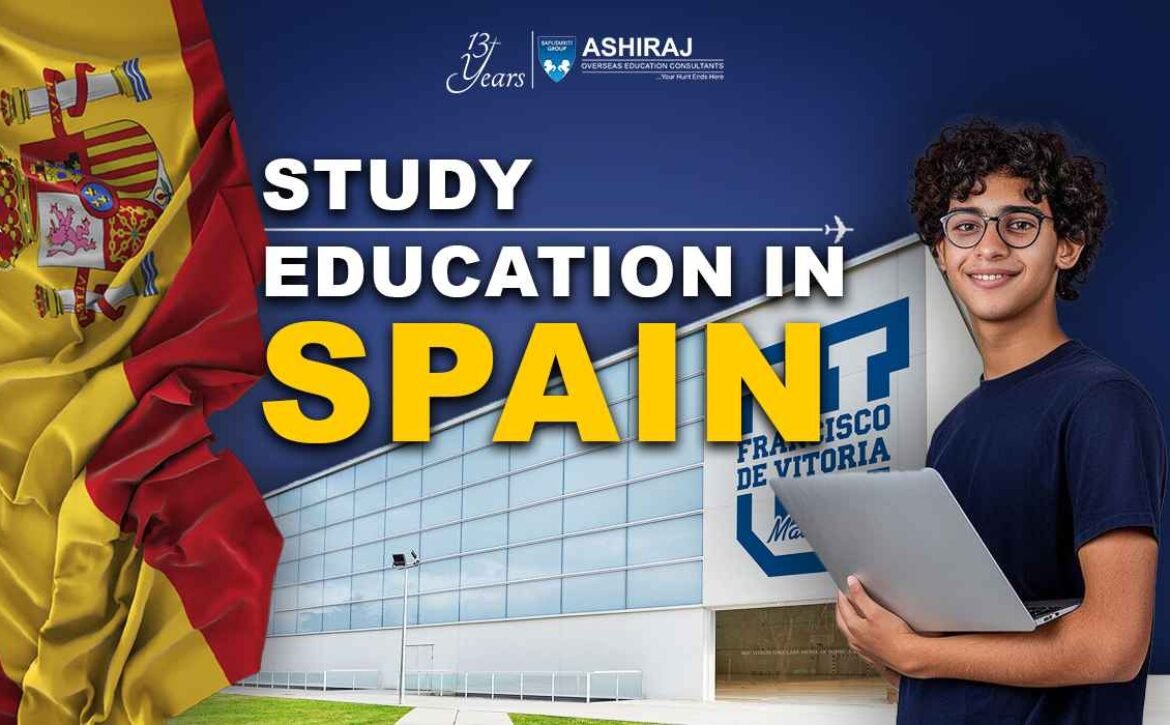
Education in Spain
Education in Spain is a multifaceted system deeply rooted in the country’s rich cultural heritage and historical evolution. Spanning from early childhood to tertiary levels, the education system in Spain is characterized by its diversity and regional autonomy. The structure of education is decentralized, with each of Spain’s 17 autonomous communities responsible for managing and implementing educational policies within its jurisdiction. This decentralized approach allows for flexibility and adaptation to regional needs and preferences, resulting in variations in curriculum, language of instruction, and administrative practices across different regions of the country.
Education in Spain encompasses both public and private institutions, with primary and secondary education being compulsory and provided free of charge in public schools. The curriculum typically includes subjects such as mathematics, science, language and literature, social studies, and physical education. At the tertiary level, Spain boasts a wide range of universities and higher education institutions renowned for their academic excellence and research contributions across various fields. Overall, Education in Spain reflects a commitment to fostering intellectual growth, cultural appreciation, and social development among its citizens, while also embracing the country’s linguistic and cultural diversity.
Why to Study Education in Spain?
- Cultural Immersion: Studying education in Spain provides a unique opportunity to immerse oneself in the rich cultural heritage of the country, enhancing both personal and professional growth.
- Linguistic Diversity: Spain’s diverse linguistic landscape offers students the chance to learn Spanish, as well as regional languages such as Catalan, Basque, and Galician, broadening their linguistic skills and cultural understanding.
- Renowned Institutions: Spain is home to prestigious universities and educational institutions known for their academic excellence and research contributions, offering top-notch programs in education and related fields.
- Practical Experience: Many education programs in Spain emphasize hands-on learning experiences, including teaching practicums and internships, allowing students to gain practical skills and insights into the field.
- Global Perspective: Studying education in Spain provides a global perspective on educational practices and policies, as well as opportunities for international networking and collaboration.
- Affordable Education: Compared to some other European countries, Spain offers relatively affordable tuition fees and living costs, making it an attractive destination for students seeking quality education without breaking the bank.
- Career Opportunities: A degree in education from Spain can open doors to diverse career opportunities both within the country and internationally, including teaching positions, educational leadership roles, and research opportunities.
Studying education in Spain offers a unique blend of cultural immersion, academic excellence, practical experience, and career opportunities, making it an ideal choice for students passionate about shaping the future of education.
Top Universities to Study Education in Spain
University | QS World University Ranking 2023 | Type of University | Average Annual Fees | Programs Offered |
University of Barcelona | 101-150 | Public | €1,000 – €3,000 | Education, Pedagogy, Teacher Training |
Autonomous University of Madrid | 151-200 | Public | €800 – €2,500 | Education, Psychology, Sociology |
University of Granada | 201-250 | Public | €900 – €2,200 | Education, Linguistics, Early Childhood |
Complutense University of Madrid | 251-300 | Public | €1,200 – €2,800 | Education, Special Education, Counseling |
Pompeu Fabra University | 301-350 | Public | €1,100 – €2,600 | Education, Language Education, Research |
- University of Barcelona: Renowned for its research in education and offering a wide range of programs in pedagogy, teacher training, and educational psychology.
- Autonomous University of Madrid: Known for its strong emphasis on interdisciplinary education, offering programs in education, psychology, and sociology.
- University of Granada: Offers comprehensive education programs with a focus on linguistics, early childhood education, and educational research.
- Complutense University of Madrid: Provides specialized programs in education, special education, and counseling, emphasizing practical skills and theoretical knowledge.
- Pompeu Fabra University: Known for its innovative approach to education, offering programs in language education, educational research, and curriculum development.
These top universities in Spain for education provide students with quality academic programs, research opportunities, and a supportive learning environment, making them excellent choices for pursuing higher education in Spain.
Course Curriculum for Education in Spain
- Comprehensive Approach: Education in Spain adopts a holistic approach to curriculum design, focusing on the development of students’ cognitive, social, emotional, and physical skills.
- Multilingual Emphasis: With a diverse linguistic landscape, the curriculum often includes language learning components, with a focus on Spanish as well as regional languages like Catalan, Basque, and Galician.
- Pedagogical Training: Education programs in Spain offer robust training in pedagogy, equipping future educators with the necessary skills and methodologies to facilitate effective teaching and learning experiences.
- Specialization Options: Students have the opportunity to specialize in various fields within education, including early childhood education, special education, language education, and educational psychology.
- Practical Experience: The curriculum often incorporates practical components such as teaching practicums, internships, and classroom observations, allowing students to apply theoretical knowledge in real-world educational settings.
- Cultural Awareness: Education in Spain emphasizes cultural awareness and diversity, integrating elements of Spanish culture and heritage into the curriculum while also promoting intercultural understanding.
- Research and Innovation: Many education programs encourage research and innovation, fostering a culture of inquiry and continuous improvement in educational practices.
The course curriculum of Education in Spain is designed to provide students with a comprehensive education grounded in pedagogical theory, practical experience, cultural awareness, and opportunities for specialization, preparing them for fulfilling careers in the field of education.
Eligibility Criteria & Admission Requirements for MS in Education in Spain
- Language Proficiency:
IELTS (International English Language Testing System): Minimum score of 6.5 overall.
TOEFL (Test of English as a Foreign Language): Minimum score of 90 (iBT).
- Standardized Tests:
GRE (Graduate Record Examination) or GMAT (Graduate Management Admission Test): Required for some graduate programs. GRE Verbal Reasoning: 155, GRE Quantitative Reasoning: 155, GMAT: 600.
- Academic Certificates:
Bachelor’s degree or equivalent from a recognized institution.
Transcripts showcasing academic performance.
- Work Experience:
Some programs may require relevant work experience, particularly for advanced degrees or specialized courses.
Experience in the field of education or related areas can be advantageous.
- Passport & Student Visa:
Valid passport with at least six months’ validity.
Student visa obtained from the Spanish consulate or embassy in the applicant’s home country.
Applicants aspiring to pursue education in Spain must meet these eligibility criteria, including language proficiency, standardized test scores, academic qualifications, work experience, and necessary travel documentation. Fulfilling these requirements ensures readiness for academic success and a smooth transition to studying in Spain.
Documents Required for Studying Education in Spain
- Passport: A valid passport with a minimum validity of six months from the intended date of entry into Spain.
- Letters of Recommendation (LOR): Two letters of recommendation from academic or professional sources highlighting the applicant’s qualifications and suitability for the program.
- Statement of Purpose (SOP): A well-written statement outlining the applicant’s academic background, career goals, and reasons for choosing the specific program in Spain.
- Curriculum Vitae (CV): A comprehensive resume detailing the applicant’s educational background, work experience, skills, and achievements.
- Official High School Transcripts: Transcripts reflecting the applicant’s academic performance during high school or equivalent education.
- Educational Certificates: Copies of academic certificates or diplomas earned from previous educational institutions, including degrees and qualifications relevant to the chosen program of study.
- Work Experience Certificate: If applicable, a certificate verifying any relevant work experience, demonstrating the applicant’s professional background and skills.
- Proof of Financial Resources: Documentation demonstrating the applicant’s ability to cover tuition fees, living expenses, and other costs associated with studying in Spain, such as bank statements or sponsorship letters.
These essential documents are crucial for the application process for education in Spain, ensuring that applicants meet the requirements and demonstrate their readiness for academic success in Spanish institutions.
Admission Process for Education in Spain
- Research Programs: Explore educational programs offered by universities in Spain, considering factors such as curriculum, faculty, and location.
- Check Eligibility: Review admission requirements for your chosen program, including academic qualifications, language proficiency, and standardized test scores.
- Gather Documents: Collect required documents such as transcripts, certificates, letters of recommendation, statement of purpose, CV, passport, and proof of financial resources.
- Language Proficiency Test: Take the required language proficiency test (IELTS or TOEFL) and achieve the minimum score specified by the university.
- Standardized Tests: If necessary, prepare and take standardized tests like GRE or GMAT and ensure scores meet the program’s requirements.
- Submit Application: Complete the online application form provided by the university, attaching all required documents and paying any application fees.
- Await Decision: Wait for the university’s decision on your application, which may take several weeks. Some programs may require an interview as part of the admission process.
- Receive Offer Letter: Upon acceptance, you will receive an official offer letter from the university outlining the terms and conditions of admission.
- Obtain Student Visa: Apply for a student visa from the Spanish consulate or embassy in your home country, providing the necessary documents including the offer letter and proof of financial resources.
- Enroll in Program: Once the visa is approved, finalize your enrollment in the program and make necessary arrangements for accommodation and travel to Spain.
Following these steps ensures a smooth admission process for pursuing education in Spain, facilitating your academic journey in a vibrant and culturally rich environment.
“Education is the most powerful weapon which you can use to change the world.”
Nelson Mandela
Cost of Education Course in Spain
- Tuition Fees: Public universities in Spain typically offer lower tuition fees compared to private institutions, ranging from €1,000 to €3,000 per year for undergraduate education programs.
- Private Universities: Tuition fees at private universities may vary significantly and can range from €5,000 to €15,000 or more per year, depending on the institution and program.
- Living Expenses: The cost of living in Spain varies depending on the city and lifestyle. On average, students should budget between €800 to €1,200 per month to cover accommodation, food, transportation, and other expenses.
- Scholarships and Financial Aid: Various scholarships, grants, and financial aid options are available for international students studying in Spain, which can help offset tuition and living costs.
- Part-time Work: International students are permitted to work part-time while studying in Spain, which can help supplement their income and cover some expenses.
- Health Insurance: Health insurance is mandatory for all international students studying in Spain. The cost varies depending on the coverage and provider but typically ranges from €50 to €100 per month.
Understanding the cost of studying education in Spain is essential for prospective students to make informed decisions and budget effectively for their academic journey in a diverse and culturally rich environment.
Scholarships for Education Courses in Spain
Scholarship Name | Amount | Application Deadline | Eligibility Criteria |
Spanish Government Scholarships | Varies | Varies | Offered by the Spanish government to international students based on academic merit and financial need. Includes tuition fee waivers, living stipends, and travel grants. Application deadlines vary by program and institution. |
Erasmus+ Program | Varies | Varies | European Union-funded scholarships available for undergraduate, master’s, and doctoral students to study, train, or volunteer abroad. Application deadlines typically fall between January and March. |
Santander Scholarships | Varies | Varies | Offered by Banco Santander to support international students pursuing higher education in Spain. Scholarships cover tuition fees, accommodation, and living expenses. Application deadlines vary by program and institution. |
Fulbright Program | Varies | October 8 (annual) | Scholarships for American students to study, research, or teach English in Spain. Eligibility criteria include academic excellence, leadership potential, and cultural ambassadorship. Application deadline is typically in October. |
DAAD Scholarships | Varies | Varies | Offered by the German Academic Exchange Service (DAAD) to support international students from Germany pursuing education and research opportunities in Spain. Deadlines vary by scholarship type and program. |
Scholarships for education in Spain provide financial support to international students, covering tuition fees, living expenses, and other study-related costs. Applicants should carefully review eligibility criteria and application deadlines to maximize their chances of securing funding for their academic pursuits in Spain.
Career Opportunities After Education in Spain
Job Profile | Average Salary (EUR) | Description |
Teacher | €25,000 – €40,000 | Educators in Spain teach various subjects at different education levels, including primary, secondary, and higher education institutions. They create lesson plans, assess student progress, and facilitate learning in classrooms. |
Education Administrator | €30,000 – €45,000 | Education administrators oversee the administrative functions of schools, colleges, or universities. They manage budgets, coordinate academic programs, and ensure compliance with educational policies and regulations. |
School Counselor | €25,000 – €35,000 | School counselors provide academic, career, and personal counseling to students. They help students overcome challenges, develop coping skills, and make informed decisions about their education and future careers. |
Education Researcher | €35,000 – €50,000 | Education researchers conduct studies and analyze data to improve educational practices and policies. They work in academic institutions, government agencies, or research organizations, contributing to advancements in the field of education. |
Curriculum Developer | €30,000 – €45,000 | Curriculum developers design and revise educational materials, courses, and programs. They collaborate with teachers, administrators, and subject matter experts to ensure curriculum alignment with learning objectives and standards. |
Education in Spain opens up diverse career opportunities in teaching, administration, counseling, research, and curriculum development. These professions offer competitive salaries and the chance to make a meaningful impact on the education system and the lives of students.
Frequently Asked Questions About Education in Spain
Most universities in Spain require international students to demonstrate proficiency in either Spanish or English. Language proficiency can be proven through standardized tests such as IELTS or TOEFL for English and DELE for Spanish.
Yes, there are various scholarships available for international students studying in Spain, including government-funded scholarships, university scholarships, and external scholarships such as Erasmus+ and Fulbright.
The cost of studying in Spain varies depending on factors such as the university, program, and location. On average, tuition fees range from €1,000 to €3,000 per year for public universities, while living expenses can range from €800 to €1,200 per month.
Yes, international students in Spain are allowed to work part-time while studying, typically up to 20 hours per week during the academic year and full-time during holidays. However, it’s essential to check visa regulations and eligibility criteria.
To apply for a student visa to study in Spain, you need to first secure admission to a recognized educational institution. Then, you can apply for a student visa at the Spanish consulate or embassy in your home country, providing required documents such as the acceptance letter, proof of financial resources, and health insurance.
Spain offers a wide range of academic programs across various fields, but some popular areas of study include business, engineering, tourism, hospitality, arts, and sciences.
Yes, many universities in Spain offer programs taught entirely in English, particularly at the master’s and doctoral levels. These programs cater to international students who may not be fluent in Spanish but wish to study in Spain.
The processing time for a student visa for Spain can vary depending on the applicant’s nationality, the consulate’s workload, and the time of year. Generally, it can take anywhere from a few weeks to several months, so it’s essential to apply well in advance of your intended start date.
Yes, international students who have completed their studies in Spain may be eligible to apply for a work permit or residency permit to stay and work in the country. Requirements and procedures vary based on individual circumstances and visa regulations.
There are various options for accommodation in Spain, including university dormitories, private apartments, shared housing, and homestays. Many universities offer assistance to international students in finding accommodation, and there are also online platforms and rental agencies to help with the search.




